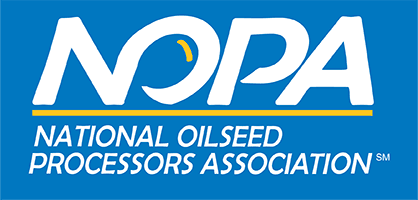NOPA and ASA Welcome Bipartisan, Bicameral Bill to Boost Domestic Energy
Legislation Introduced to Prohibit Foreign Feedstocks from Utilizing 45Z Tax Credit
WASHINGTON, Sept. 24, 2024 – The National Oilseed Processors Association (NOPA) and the American Soybean Association (ASA) today hailed the introduction of bipartisan, bicameral legislation to support renewable fuels produced from domestically-sourced feedstocks.
The Farmer First Fuel Incentives Act, introduced by Sens. Sherrod Brown, D-Ohio and Roger Marshall, R-Kansas, and Reps. Tracey Mann, R-Kansas and Marcy Kaptur, D-Ohio, would restrict eligibility for the Section 45Z Clean Fuel Production Tax Credit to fuels produced from domestic feedstocks and make 45Z a 10-year credit by extending it to 2034.
“NOPA commends this bipartisan, bicameral legislative effort which puts U.S fuel producers, U.S. crushers and U.S. farmers first. We thank Senators Brown and Marshall and Representatives Mann and Kaptur for their leadership,” said NOPA President and CEO Kailee Tkacz Buller. “We support free trade and open markets, but do not believe foreign feedstocks should benefit on the backs of U.S. taxpayers to the detriment of U.S. farmers. Without this fix, the 45Z credit will incentivize the use of foreign feedstocks over those grown by U.S. farmers. Our industry has made significant investments to expand U.S. crush capacity by 30 percent and this fix is pivotal to ensuring these investments are delivered.”
“Biofuel production paves a key path for our country to be a clean energy leader, and U.S. farmers who grow the crops going into those biofuels take pride in helping reduce greenhouse gas emissions while supporting the U.S. economy and energy independence,” said ASA President Josh Gackle, a North Dakota soybean farmer. “However, for continued growth of America’s promising biofuels industry, U.S. farmers need the support of a final 45Z rule that prioritizes domestically sourced feedstock.”
The introduction of this legislation follows a recent surge of imported low carbon intensity (CI) feedstocks including waste feedstocks such as Used Cooking Oil (UCO), beef tallow, and yellow grease that generate higher credits than U.S soybean oil in California’s Low Carbon Fuel Standard (LCFS). Without this legislation, biofuel producers will have added incentive to buy imported feedstocks over U.S. soybean oil when the 45Z tax credit goes into effect on Jan. 1, 2025.
From Jan.1, 2023 to June 30, 2024, the U.S. imported a total of 7.9 billion pounds of UCO and tallow, which equates to the soybean oil crushed from an equivalent of over 650 million bushels. NOPA members crush approximately 2 billion bushels annually. For perspective, from 2000-2021 the total imports of UCO and tallow into the U.S. totaled 6.1 billion pounds.
Read More:
- NOPA And ASA Praise Continued Bipartisan Efforts to Support Domestic Feedstocks In 45Z Rulemaking
- NOPA and ASA Applaud Bipartisan Senate Effort Urging Treasury to Issue Domestic Feedstock Requirements For 45z
- NOPA to USDA: Feedstocks from U.S. Oilseeds Offer Significant Decarbonization Opportunities and Should Not Be Left Behind
###
Organized in 1930, the National Oilseed Processors Association (NOPA) represents the U.S. soybean, canola, flaxseed, safflower seed, and sunflower seed-crushing industries. NOPA’s membership is engaged in the processing of oilseeds for meal and oil that are utilized in the manufacturing of food, feed, renewable fuels, and industrial products. NOPA’s 17 member companies operate over 70 softseed and solvent extraction plants across 21 states, crushing approximately 97% of all soybeans processed in the United States, the equivalent to more than 2 billion bushels annually. More information at www.NOPA.org
The American Soybean Association (ASA) represents U.S. soybean farmers on domestic and international policy issues important to the soybean industry. ASA has 26 affiliated state associations representing 30 soybean-producing states and more than 500,000 soybean farmers. More information at soygrowers.com.

